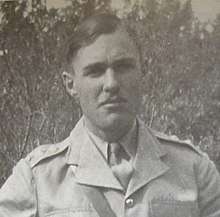William Brown (British Army officer)
Major William Alexander Brown MBE (13 December 1922 – 5 December 1984) was a British military officer in British India. During the Partition of India, he led a successful coup against the ruling Maharajah of Jammu and Kashmir which resulted in the Gilgit Agency becoming part of Pakistan administered Kashmir.
William Alexander Brown | |
|---|---|
 | |
| Born | 13 December 1922 Melrose, Scotland |
| Died | 5 December 1984 (aged 61) Scotland |
| Allegiance | |
| Service/ | |
| Years of service | 1941–1959 |
| Rank | Major |
| Commands held | 12th Frontier Force Regiment Frontier Corps Gilgit Scouts |
| Battles/wars | First Indo-Pakistani War |
| Awards | Most Excellent Order of the British Empire Sitara-i-Imtiaz |
Early life
Brown was born in Melrose, Scotland. His father William Brown had served with the Gordon Highlanders during the First World War and was awarded the Military Cross while his paternal grandfather Alexander Laing Brown had been Liberal Unionist MP for the Hawick Burghs between 1886 and 1892.[1] Brown was educated at St. Mary's School, Melrose and George Watson's College in Edinburgh. In 1941, upon finishing school he enlisted in the Argyll and Sutherland Highlanders and in December sailed for India.[1]
India
On his arrival in India he attended the Officer Cadet Training Unit in Bangalore and was commissioned as a Second Lieutenant into the 10th/12th Frontier Force Regiment. He soon transferred to the Frontier Corps of the Scouts and Militias, serving with the South Waziristan Scouts in the North Western Frontier Province and becoming proficient in Pushto.[1] In 1943 he was posted to the Gilgit Agency where he would spend the next three years and learn Shina and Burushaski. In 1946 he served briefly with the Tochi Scouts in North Waziristan and in 1947 he was posted to Chitral as the Acting Commandant of the Scouts.[1]
Operation Datta Khel
On 3 June 1947 the Gilgit Agency was transferred to the control of the princely state of Jammu and Kashmir. The Maharajah Hari Singh appointed Ghansar Singh Jamwal to govern the area on his behalf. On 22 October 1947, Pashtun militia aided by the Pakistan Army invaded Jammu and Kashmir.[2] On 26 October, Hari Singh announced Jammu and Kashmir would be joining India and signed an instrument of accession. The Maharajah's decision was controversial as he was a Hindu ruler governing a majority Muslim populace. On hearing of the decision Brown urged Ghansar Singh to ascertain the wishes of the local Muslim community over the accession, and warned him that he may have to take certain measures to avoid bloodshed.[3] Brown considered that the whole of Kashmir, including Gilgit, should go to Pakistan in view of the fact that the population was predominantly Muslim and the whole raison d'etre of Pakistan was to accommodate majority Muslim provinces.[4] Singh ignored the warning and Brown then began to plan what became known as Operation Datta Khel.[3]
On 31 October, the Gilgit Scouts under the command of Brown, surrounded the Gilgit Residency and took Ghansar Singh into protective custody.[5] Brown then requested troops be sent from Pakistan and on 1 November he established a military administration. On assuming control, Brown learnt of a plan from a large section of his contingent to set up an independent republic called Gilgit-Astor.[3] On 2 November he hoisted the Pakistani flag over the Residency and announced the accession of Gilgit to Pakistan.[6] He was then instructed by Sir George Cunningham, Governor of the North West Frontier Province to restore order in the region.[3] On 16 November, Pakistan sent Muhammad Alam to Gilgit to take control as a political agent and on 18 November Gilgit and its neighbouring states signed an instrument of accession to Pakistan.[3] Brown remained in command of the Scouts until 12 January 1948 when he was replaced by Aslam Khan.[3]
Brown's actions were condemned by the Indian government who regarded it as a coup, whereas the Pakistani government hailed it claiming it had the full support of the people.[3] Brown himself acknowledged the severity of his actions when he later remarked that "my actions appeared to possess all the elements of high treason. Yet I knew in my own mind that what I had done was right."[3]
Later life
After returning from Gilgit in January 1948, Brown transferred to the Frontier Constabulary for the next two years. In July 1948 he was made a Member of the Most Excellent Order of the British Empire by the British Government. Brown remained in Pakistan until 1959 when he returned to the United Kingdom with his family. In 1960 he established a livery yard and riding school at St Boswells in Scotland. He died of a heart attack on 5 December 1984 aged 62.[1]
In 1993 Brown was posthumously awarded the Sitara-i-Imtiaz by the government of Pakistan.[7]
References
- William Brown, Gilgit Rebelion: The Major Who Mutinied Over Partition of India, Pen and Sword, 30 November 2014
- Marin, Steve (2011). Alexander Mikaberidze, ed. Conflict and Conquest in the Islamic World: A Historical Encyclopedia, Volume 1. ABC-CLIO. p. 394. ISBN 978-1598843361.
- Victoria Schofield, Kashmir in Conflict: India, Pakistan and the Unending War, I.B.Tauris, 2003
- Sushant Singh. "Those Troubled Peaks". The Indian Express.
- Aman M. Hingorani, Unravelling the Kashmir Knot, SAGE Publishing India, 23 May 2016
- K.N. Raghavan, Dividing Lines, Leadstart Publishing PvtLtd, 19 February 2018
- Jonaid Iqbal. "Those Troubled Peaks". IDawn.